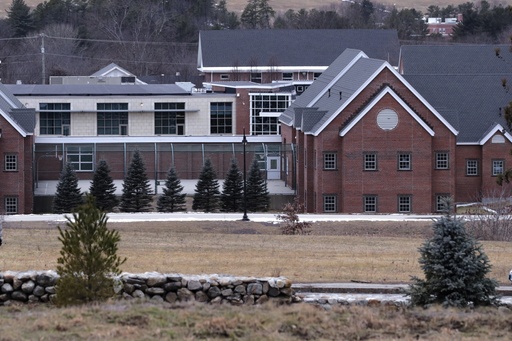BRENTWOOD, N.H. (AP) — A New Hampshire jury awarded $38 million to the man who blew the lid off abuse allegations at the state’s youth detention center Friday, finding in a landmark case that the state’s negligence allowed him to be beaten, raped and held in solitary confinement as a teen.
David Meehan’s attorney said his client was “overwhelmed and overjoyed” by what he called the largest jury award in a civil case in New Hampshire history, though the state said the amount will be reduced to $475,000 under its law that caps damages.
“David now feels like he has a reason to live,” Rus Rilee, Meehan’s attorney, said.
Meehan, 42, went to police in 2017 and sued the state three years later. Since then, 11 former state workers have been arrested and more than 1,100 other former residents of the Youth Development Center in Manchester have filed lawsuits alleging physical, sexual and emotional abuse spanning six decades.
Meehan’s lawsuit was the first to be filed and the first to go to trial. After four weeks of testimony, jurors returned a verdict in under three hours.
“It highlights how strong all of these cases are against the state,” Rilee said. “We are going to expect a lot more quick verdicts against the state on hundreds and hundreds of more of these cases to come.”
Jurors were instructed that if they believed the state was liable for Meehan’s injuries, they should come up with a figure that represented “full, fair and adequate” compensation. They awarded $18 million in compensatory damages and $20 million in “enhanced” damages, the latter of which can be added if a defendant acted with reckless indifference or abused its power. But they also said Meehan had proven only one “incident” or episode in which he was injured, without being aware that New Hampshire’s law allows claimants against the state to recover a maximum of $475,000 per incident.
“The jury did find in favor of Mr. Meehan for $38 million but they found only one incident of negligence against the Department of Health and Human Services,” said Assistant Attorney General Brandon Chase. “Under state law Mr. Meehan has a judgement in his favor of $475,000.”
But Rilee said the issue will be settled by the state Supreme Court on appeal.
“There appears to be some confusion on the jury verdict form but we’ll take care of that in Concord,” he said. “The jury award is $38 million.”
Over the course of the trial, state argued it was not liable for the conduct of “rogue” employees and that Meehan waited too long to sue. The defense also said his case relied on “conjecture and speculation with a lot of inuendo mixed in.”
“Conspiracy theories are not a substitute for actual evidence,” attorney Martha Gaythwaite said in her closing statement Thursday.
The state called five witnesses to the stand, including Meehan’s father, who answered “yes” when asked whether his son had “a reputation for untruthfulness.” Others who testified included a longtime youth center principal who said she saw no signs of abuse over four decades and a psychiatrist who diagnosed Meehan with bipolar disorder, not the post-traumatic stress disorder claimed by his side.
Meehan’s attorneys accused the state of encouraging a culture of abuse marked by pervasive brutality, corruption and a code of silence. They called more than a dozen witnesses, including former staffers who said they faced resistance and even threats when they raised or investigated concerns, a former resident who described being gang-raped in a stairwell, and a teacher who said she spotted suspicious bruises on Meehan and half a dozen other boys.
“They still don’t get it,” David Vicinanzo said in his closing statement. “They don’t understand the power they had, they don’t understand how they abused their power and they don’t care.”
Meehan himself spent three days on the witness stand describing his three years at the Manchester facility and its aftermath. He told jurors that his first sexual experience was being violently raped by a staffer at age 15 and that another staffer he initially viewed as a caring father figure became a daily tormenter who once held a gun to his head during a sexual assault.
“I’m forced to try to hold myself together somehow and show, as a man, everything these people did to this little boy,” he said. “I’m constantly paying for what they did.”
In cross-examining Meehan, the state’s attorneys portrayed him as a violent child who continued to cause trouble at the youth center — and a delusional adult who is exaggerates or lies to get money. The approach highlighted an unusual dynamic in which the attorney general’s office is both defending the state against the civil lawsuits and prosecuting suspected perpetrators in the criminal cases.
Though the state will be relying on Meehan’s testimony in the criminal cases, it tried to undermine his credibility in the current case.
Rilee called the opposing counsel’s conduct “despicable.”
“I think it was a really sad chapter in our state’s history to have victims of child abuse at the hands of state employees dragged into court and brutalized and victim shamed in the way David was,” he said.
The outcome of Meehan’s case could affect the criminal cases, the remaining lawsuits, and a separate settlement fund created by the state as an alternative to litigation. Under the settlement fund, claimants can get up to $1.5 million, though lawmakers are expected to soon increase the limit to $2.5 million.


